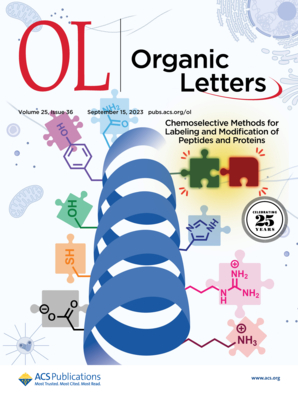以环烷烃为氢源,Pt/Al(PO3)3催化苯酚转移氢解制芳烃
IF 5
1区 化学
Q1 CHEMISTRY, ORGANIC
引用次数: 0
摘要
苯酚选择性氢脱氧制芳烃对木质素衍生的含氧化合物转化为高附加值芳香化学品具有重要意义。在这里,我们报道了偏磷酸铝负载的Pt纳米颗粒(Pt/Al(PO3)3)在温和条件下(低至150°C),以环烷烃为氢源,选择性地将苯酚转移氢解为芳烃。除取代苯酚外,本催化剂体系还可用于取代儿茶酚或愈创木酚。本文章由计算机程序翻译,如有差异,请以英文原文为准。

Pt/Al(PO3)3-Catalyzed Transfer Hydrogenolysis of Phenols to Arenes Using Cyclic Alkanes as the Hydrogen Source
The selective hydro-deoxygenation of phenols to arenes is of importance for upgrading lignin-derived oxygenates to value-added aromatic chemicals. Here, we report aluminum metaphosphate-supported Pt nanoparticles (Pt/Al(PO3)3) for selective transfer hydrogenolysis of phenols to arenes using cyclic alkanes as the hydrogen source under mild conditions (as low as 150 °C). In addition to substituted phenols, the present catalyst system can also be applied to a substituted catechol or guaiacol.
求助全文
通过发布文献求助,成功后即可免费获取论文全文。
去求助
来源期刊

Organic Letters
化学-有机化学
CiteScore
9.30
自引率
11.50%
发文量
1607
审稿时长
1.5 months
期刊介绍:
Organic Letters invites original reports of fundamental research in all branches of the theory and practice of organic, physical organic, organometallic,medicinal, and bioorganic chemistry. Organic Letters provides rapid disclosure of the key elements of significant studies that are of interest to a large portion of the organic community. In selecting manuscripts for publication, the Editors place emphasis on the originality, quality and wide interest of the work. Authors should provide enough background information to place the new disclosure in context and to justify the rapid publication format. Back-to-back Letters will be considered. Full details should be reserved for an Article, which should appear in due course.
 求助内容:
求助内容: 应助结果提醒方式:
应助结果提醒方式:


